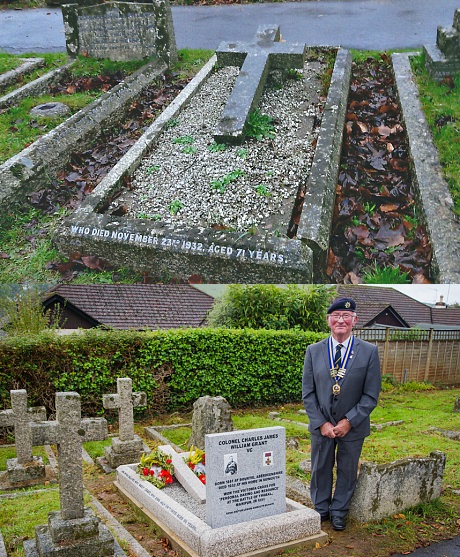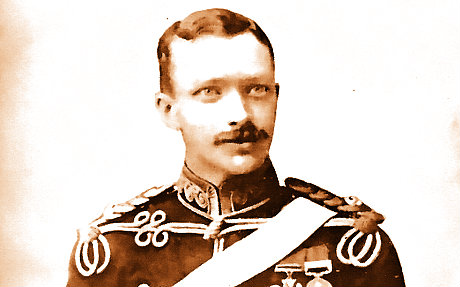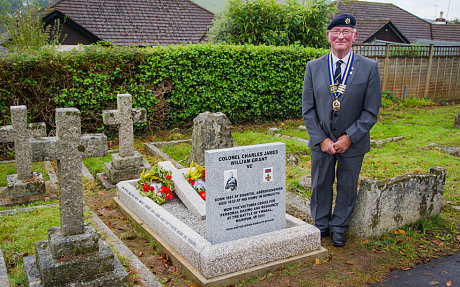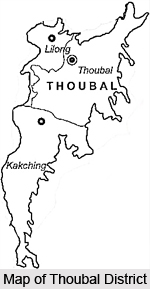Colonel Charles Grant earned the Victoria Cross because he remained brave and resourceful even when faced with an enemy that’s greatly superior in numbers. However, after nearly 125 years on, his valor became forgotten until volunteers decided to restore his neglected gravestone.
Colonel Charles Grant showed bravery and ingenuity during the Battle for Thoubal in 1891. He was able to trick the attacking enemy, vastly superior in number compared to his own men, into believing that a greater number of forces was on his side. Then, he spurned the possibility of regaining safe passage in exchange for his retreat twice.
Because of these, the men with him saw Colonel Charles Grant as an indomitable commander, a “tiger in a fight”, a soldier deserving of a Victoria Cross.
However, 125 years from his death, the gravestone of the war hero was showing signs of neglect — it was crumbling away, an effect brought about by enduring through a number of bitter harsh winters.
Seeing His Worth
The town’s Royal British Legion, determined not to let Colonel Charles Grant fall into the category of the forgotten, spent two months just to restore the local hero’s gravestone as well as the plot surrounding it.
Additionally, they have added a new memorial stone marking his resting place. In it, one can see a rare photo of Colonel Charles Grant. The total cost of the commemorative stone came up at £1,400 but that had already been taken care of by a local benefactor.
As the chairman of the Royal British Legion’s Sidmouth branch, Dave O’Connor, said, the resting place of Col. Charles Grant deserves to be restored since the man laid in it was a remarkable soldier, a true national hero during his time. He added that the group feels honored he had decided to make Sidmouth his permanent home and because of that, they just couldn’t let his grave fall and crumble away.

Dave also hopes that following the repair, there will be more people who will turn up for his honoring ceremony and take time to reflect in the courage Col. Charles Grant showed in face of his adversaries.
The Local Hero’s Story
Both the parents of Charles James William Grant were born in India. They were of Scottish descent, from military families who were in the country serving under the British empire.
Grant’s father became a Lieutenant General and the young Charles Grant, born in Aberdeenshire in 1861, soon followed in his steps in the military.
He enlisted as a Gentleman Cadet in Sandhurst’s Royal Military Academy and went on to receive his first commission in 1882 with the Suffolk Regiment. Two years after, he was eventually transferred to the British Indian Army.

It was in 1891 when then Lieutenant Charles Grant volunteered to march into Manipur, a semi-independent state lying between India and Burma, along with a small detachment of Punjabi troops and Gurkhas in a bid to free British soldiers and prisoners who were held prisoners there. Unknown to them, the said campaign had been futile even from the start as the men they set out to free had been killed even before they started their march.
The group came under fire when they were seven miles inside Manipur forcing them to take cover at Thoubal and take defense against their enemies there. The Manipuri army firing against them were of larger number, had far superior rifles and was equipped with two artillery pieces.
Colonel Charles Grant with his detachment of about eighty-odd men fought off the enemy from their position for ten days. They faced off an unbelievable number of 2,000 enemy soldiers at the height of the battle.
Ultimately, Grant was able to persuade the Manipuri army that he had the support of a far greater number of troops behind him. He did this by referring to himself as “Colonel Howlett” and adding extra stars into his uniform, sewing them himself. By doing so, he hinted at being in command of a whole regiment.
The said gimmick succeeded and it is believed that because of the ruse Col. Charles Grant presented, the attacking fighters became more cautious with their attacks against Grant’s smaller band.
On the battle’s ninth day, Colonel Charles Grant was able to launch a series of attacks against the enemy’s positions despite being almost out of ammunition. Incredibly because of Grant’s campaign, the enemy gave up and retreated the following day.
Col. Charles Grant got involved in further fighting even after the Battle for Thoubal. His horse got shot from beneath him and later on, he was hit by a bullet in his neck. However, in spite of the wound he sustained, the bullet had taken a bit of fabric from his shirt and tunic through the wound with it, Grant refused to be given medical treatment until after he was able to capture the position he was attacking.
In a letter to his mother, Col. Charles Grant told her about his getting wounded saying — “Feeling the wound with my fingers and being able to speak and feeling no violent flow of blood I discovered I wasn’t dead quite yet, so I reloaded and got up.”
He was awarded the Victoria Cross after his daring exploits with the citation reading that he was an inspiration to his men when it came to equal heroism, personal daring and resourcefulness.
Even though the bravery of Col. Charles Grant is largely forgotten now, his exploits were greatly lauded in his time. he even became a widely celebrated individual in the British empire with his picture appearing on cigarette cards and his story featured in various magazines.
Col. Charles Grant already retired from the army in 1913 but when the First World War broke out, he re-enlisted and became part of the 3rd Royal Scots. He was already 53 at that time and served as a Draft Conducting Officer.
As Kim Smith, the president of Sidmouth’s Royal British Legion branch, pointed out, Col. Charles Grant had a sense of duty which remained undying through the years. It was one quality he had shared with so many of his generation.
Settling in Sidmouth, Charles Grant built one of the town’s grandest and largest homes of the interwar years. He died there in 1932. Mary, his wife, died years later, in 1959, and was buried alongside him.
As for the Victoria Cross and the other medals of Col. Charles Grant [the lot included the 1914-15 Star, the British War Medal 1914-18 and the Victory Medal], they went under auction way back in 2011. The buyer remained unnamed until today as well as the whereabouts of the brave colonel’s war decorations.

